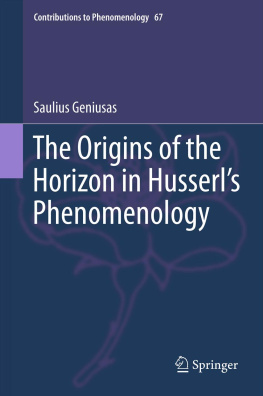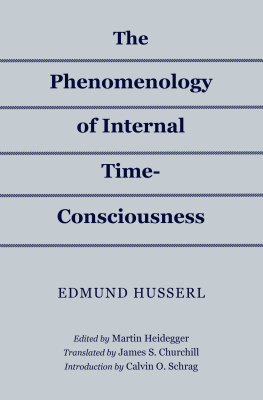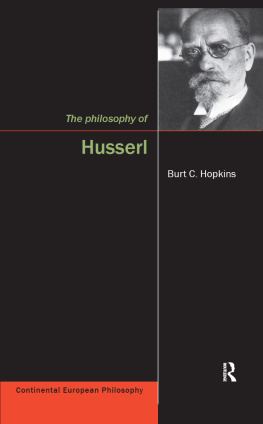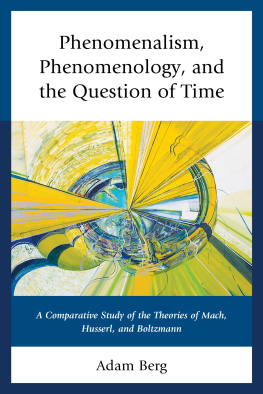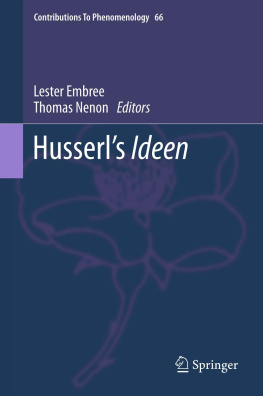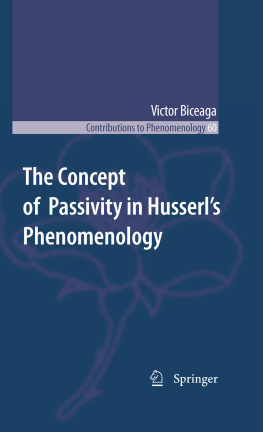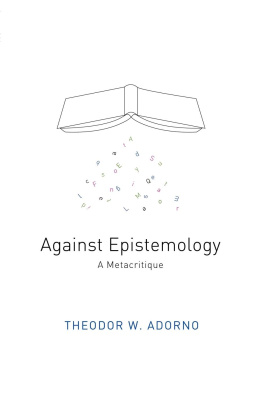1.1 A Preliminary Determination of the Horizon
The following study aims to offer a systematic inquiry into the horizon-problematic in Husserls phenomenology. A full-fledged determination of the notion of the horizon cannot be offered at the outset; its establishment must rest upon the subsequent investigation. Nonetheless, so as to provide the analysis itself with a direction, we are in need of the guiding sense of the theme under scrutiny. Since the philosophical notion of the horizon derives from the resources of everyday speech, the provisional determination of this notion can be developed on the basis of how the word the horizon figures in its everyday use.
I stand at the shore of the ocean, I look out into the distance, and I see the line at which the ocean meets the skysuch is the most common image one employs to characterize the horizon. From this common image, one can extract three dimensions of sense, and it is these dimensions that make up the preliminary sense of the horizon.
The horizon is the line at which the ocean or the sea meets the sky. The horizon thereby reveals itself as a limit , which constrains our visual field. Yet the limit in question need not be conceived as a negative force. After all, a phenomenon that falls outside the horizon is not a phenomenon at all. Moreover, not without a reason do we also speak of the horizons of knowledge , experience , and interests . Such a broad employment of this word indicates that the belongingness to the horizon as a necessary condition of manifestation should in no way be restricted to visual or even perceptual phenomena alone. The etymological sense of the horizon corroborates our expansive use of this term: the notion of the horizon derives from the Greek o , a verb which can be roughly translated as to divide, to delimit, mark off by boundaries, and which in Antiquity was employed primarily in the context of astronomy. Since delimitation is determination and since the meaning of any phenomenon rests upon its determination, the horizon reveals itself as the general framework, within which phenomena obtain their meaning. Such, then, is the first determination of the horizon: the horizon is precisely what delimits phenomena; it is what allows phenomena to manifest themselves to us .
The horizon, as remarked, is a line that marks the intersection of the sea and the sky. It is, however, a peculiar line. Its peculiarity lies in the fact that this line is neither drawn , nor can it be drawn . If we were to draw it, we would already see what lies beyond it. And so, as Hegel, for instance, has shown in his critique of Kant, by positing a limit, consciousness immediately removes it. Yet things appear different in regard to a line that in principle evades determination: the more I approach it, the more it recedes; the more I advance toward it, the more it distances itself from me. Thus already as an everyday term, the horizon reveals itself as irreducibly malleable . Due to its ineradicable plasticity, the horizon shows itself as an unsurpassable limit. Such being the case, no matter how much we can try to enlarge our field of vision, knowledge, or experience, the field in question nonetheless remains limited. This is the second sense of the horizon I wish to highlight: the horizon is a limit that is in principle unsurpassable .
Thirdly, even though the horizons always remain limited, nonetheless, they can always be modified and enlarged. We enlarge them by changing the situation we find ourselves in: by drawing nearer to the indeterminate line, or by moving away from it. The horizon thereby reveals itself as relative in regard to our whereabouts. This relativity gives rise to the realization that the general framework of sense that embraces phenomena is dependent upon our own situatedness. The question of how we came to inhabit our present standpoint thereby proves to be inseparable from the generation of the horizon itself. We thereby obtain the third sense of the horizon: the horizon is relative in regard to our current situatedness .
Such, then, is the threefold determination of the horizon: the horizon is a versatile and unsurpassable limit, which is always relative to subjectivity and which delimits each and every phenomenon . This threefold determination is crucial for the phenomenological appropriation of this everyday word. Yet it is just as crucial to emphasize that this determination of the horizon is only preliminary . Precisely because the phenomenological employment of this term is an attempt to expose, as Hans-Georg Gadamer would say, the logical instinct of everyday speech, it cannot be an uncritical appropriation of how this notion figures in its common use. The provisional notion of the horizon needs to be supplemented with an account of the horizon as a philosophical notion.
1.2 The Horizon as a Philosophical Notion and Its Historical Origins
The philosophical application of the notion of the horizon can be traced back at least to the Neo-Platonic context of the doctrine of emanation. We find the notion of the horizon already in the so-called The Book of Causes ( Liber de causis ), a popular work in the Middle Ages, which was often falsely attributed to Aristotle. Although the authorship of this work still remains unknown, after William of Moerbeke translated Proclus works into Latin, it became apparent that most of the content of this work was taken from Proclus Elements of Theology . This fact allows one to claim that the Neo-Platonic appropriation of the notion of the horizon marks the emergence of this term in philosophy as a whole. In Liber de causis , the notion of the horizon emerges in the context of determining the place of the human soul, which is said to find itself in the horizon of eternity under and above time. However, even though the notion of the horizon emerges in the context of highly significant themes, in Liber de causis this notion occurs only a few times.
Although the Neo-Platonic problem of emanation by no means exhausts the employment of the notion of the horizon in Medieval philosophy, until the thirteenth century the task of determining the location of the soul with regard to time and eternity remained the overall context in which the philosophical application of the notion of the horizon found its home. The task of obtaining a better understanding of how the soul could find itself at the borderline between time and eternity remained the motivating force behind the employment of the notion of the horizon in the works of Isaak ben Salomon Israeli, Alanus of Lille, William of Auvergne, as well as Albertus Magnus. This context was also determinative of the manner in which the notion of the horizon figured in the works of Meister Eckhart. However, the situation changed with Thomas Aquinas, who was the first to give the notion of the horizon a specifically anthropological meaning. For Aquinas, it was no longer just the soul, but the human being as a whole that found itself within a specific horizon: being composed of the spiritual and physical nature, the human being was said to have the limits of both natures in itself.

